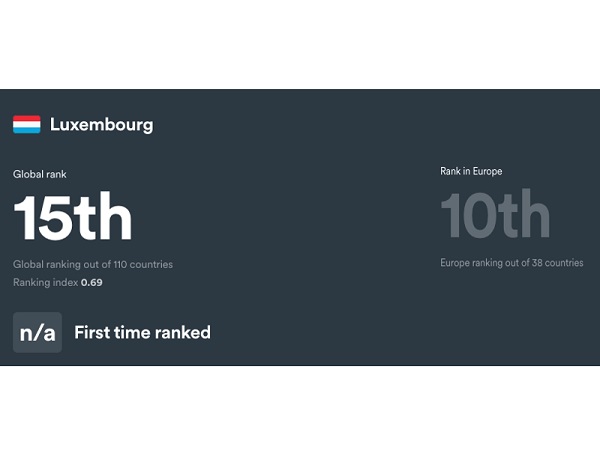 Credit: Surfshark
Credit: Surfshark
The third annual edition of the Digital Quality of Life Index (DQL) has ranked Luxembourg 15th among 110 countries in the 2021; according to the global digital wellbeing study, Luxembourg excels in internet quality, but lacks e-security.
Covering 90% of the global population, the DQL study is conducted by the cybersecurity company Surfshark and evaluates countries based on a set of five fundamental digital wellbeing pillars. Luxembourg excels in four, specifically in internet quality (ranks 6th), e-infrastructure (9th), internet affordability (ranks 13th) and e-government (22nd), but displays comparatively lower results in e-security (32nd).
Overall, Luxembourg made a great debut at DQL ranking, coming in 15th place and doing better than the global average in all five DQL pillars. The country excelled globally in internet quality, ranking 6th worldwide. It also showed the fastest mobile speed growth year-over-year and had the second best mobile internet stability in the world.
According to DQL 2021, Luxembourg’s internet affordability was around 70% better than the global average and its e-infrastructure made it to the Top 10 worldwide, surpassing the United Kingdom, France and Singapore. People in Luxembourg had to work one hour thirteen minutes to afford the cheapest broadband internet package, whereas the global average was six hours.
However, the study showed that Luxembourg’s e-security has room for improvement, ranking 32nd in the world.
“Digital opportunities have proved to be more important than ever during the COVID-19 crisis, stressing the importance for every country to ensure fully remote operational capacities for their economies”, explained Vytautas Kaziukonis, CEO of Surfshark. “That is why, for the third year in a row, we continue the Digital Quality of Life research, which provides a robust global outlook into how countries excel digitally. The index sets the basis for meaningful discussions about how digital advancement impacts a country’s prosperity and where improvements can be made”.
Overall, six out of ten countries holding the highest scores are located in Europe, following last year’s trend. Denmark ranks 1st in DQL for the second year in a row and is closely followed by South Korea. Finland ranks 3rd, while Israel and the United States round out the top five of 110 nations that were evaluated. The bottom five countries are Ethiopia, Cambodia, Cameroon, Guatemala and Angola.
The DQL 2021 research examined a total population of more than 6.9 billion people in terms of five core pillars and fourteen underpinning indicators that provide a comprehensive measure. The study is based on open-source information provided by the United Nations, the World Bank, Freedom House, the International Communications Union and other sources.
The final DQL 2021 report and an interactive country comparison tool are available at https://surfshark.com/dql2021.








